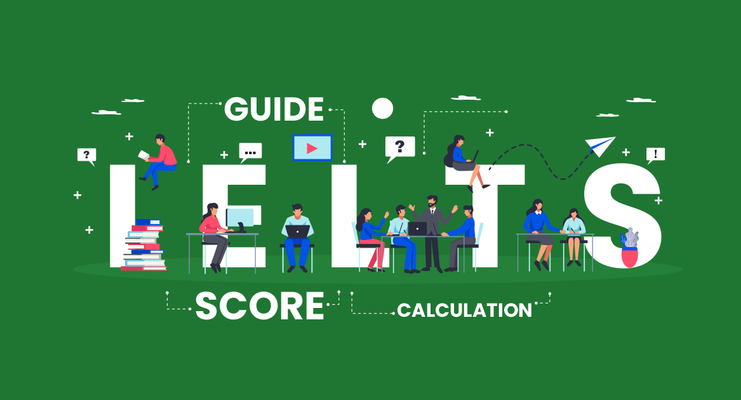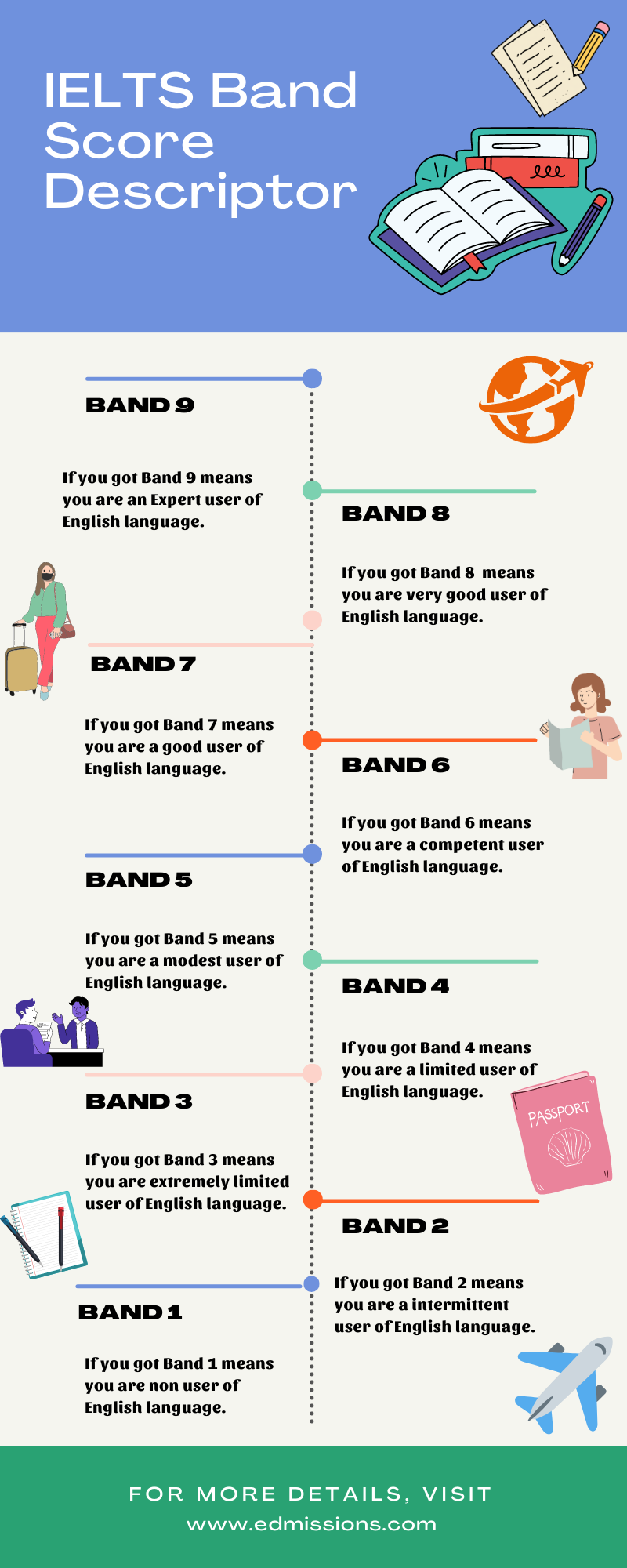A complete guide to IELTS score and how it is calculated section-wise
6 mins read 7222 Views
By Prabhadri Suman|Updated On - 2024-01-10 18:06:45
Learn how to calculate your IELTS band score and understand the scoring system for each section of the exam with this comprehensive guide.

Topics Covered:
- IELTS Band Score Descriptor
- Difference Between Raw Scores and Band Scores in the IELTS
- Formula for IELTS Band Scores Calculation
- Understanding IELTS Band Score Section-Wise
- Tips to Improve your Final IELTS band score
- Conclusion
To gain admission to the desired university, most students aspiring to study abroad are required to take the IELTS examination. It is crucial for these individuals to comprehend the process of calculating IELTS band scores. This article aims to provide information on the calculation of IELTS band scores.
The IELTS examination consists of four modules: Listening, Reading, Writing, and Speaking, and test-takers are awarded band scores ranging from 1 to 9. The overall band score is calculated by averaging the scores of these four modules and rounding up to the nearest whole or half band. In this blog, we will cover the evaluation and assessment criteria used to determine IELTS band scores. It is essential for candidates to have a clear understanding of how these scores are marked, so let's begin.
IELTS Band Score Descriptor
Everything about the IELTS band score can be understood if we first understand what each band score signifies:
- Band 9: An expert user has demonstrated accurate, appropriate, and fluent usage of the English language while displaying complete mastery.
- Band 8: An individual who has attained level 8 in English can express themselves fluently with only occasional grammatical errors and poor phraseology. They may not grasp all the elements of a narrative that is unfamiliar to them. In other words, they may handle dense and complicated material with ease.
- Band 7: An individual who aspires to achieve mastery of the English language has near-perfect mastery, despite some occasional mistakes, inaccuracies, and misinterpretations. They are able to handle complex language satisfactorily while understanding the reasoning behind it.
- Band 6: Despite a few instances of improper usage, inaccuracies, and misinterpretations, the aspirant has practical English language command. They can use and understand complex language, especially during familiar situations.
- Band 5: An aspirant may not have mastered English completely and might make several blunders. However, they will be able to handle basic communication in their work environment.
- Band 4: An individual with a limited knowledge of English may have trouble communicating effectively. He or she may also have trouble understanding spoken or written English.
- Band 3 : An extremely limited user understands and communicates just basic meanings in highly familiar scenarios. The communication is not fluent and is often disrupted.
- Band 2 : These aspiring students have a tough time comprehending and speaking English correctly.
- Band 1: Not able to speak English proficiently except for a few words.

Difference Between Raw Scores and Band Scores in the IELTS
The scoring for the listening and reading sections of IELTS is based on the number of correct answers that a candidate gives on the test. A candidate's score is translated onto a scale from 1 to 9 after they're scored out of 40. For example, a 39-40, 37-38, 35-36, 32-34, and 30-31 raw score on the listening portion of the IELTS test translates to a 9, 8.5, 8, 7.5, and 7 band score, respectively.
Academic and General Training tests are included in the IELTS reading section. To receive a higher band score in IELTS, a candidate must get a better raw score on the General Training Reading test than on the academic one.
In the IELTS writing and speaking sections, there are two tasks each, and the examinees are assessed on the basis of certain criteria. The examiners award IELTS scores on the basis of four categories: Task Achievement (Task 1) and Task Response (Task 2), Lexical Resource, Coherence, and Cohesion, and Grammatical Range and Accuracy.
The Speaking section is rated on the basis of Grammatical Range and Accuracy, Fluency and Coherence, Lexical Resource, and Pronunciation. Each category is given equal weightage, and the band scores are determined as the sum of scores awarded for each category.
Formula for IELTS Band Scores Calculation
The IELTS (International English Language Testing System) exam consists of four sections: Listening, Writing, Reading, and Speaking. The band score is the sum of the scores in the four sections, and it is then rounded to the nearest half or whole (whichever is closer). For example, if an applicant receives 6.5, 6.5, 5.0, and 7.0 in the four sections, then their average will be 6.25 and the band score will be rounded to the nearest half, which is 6.5.
Suppose another candidate gets 4.0, 3.5, 4.0, and 4.0 for these sections, their average score will be 3.875. Then their IELTS score will be 4.0.
An individual who receives 6.5, 6.5, 5.5, and 6.0 in these sections will have an average score of 6.125 and a band score of 6.0. If the average finishes at .25, the overall band score will be rounded to the nearest half band, which will be .50. If it ends at .75, it will be rounded to the next whole band.
| IELTS Section | Score |
| Reading | 6.5 |
| Writing | 6.5 |
| Listening | 5.5 |
| Speaking | 6.0 |
| Average of all 4 sections | 6.125 |
| Overall Score | 6 |
Understanding IELTS Band Score Section-Wise
Before preparing for the IELTS tests, it is crucial to have a comprehensive understanding of the IELTS Band Score Chart and scoring system, as your performance level is determined by your IELTS band score. To gain clarity on the assessment criteria and how scores translate into section-wise band scores, go through these following sections below.
IELTS Listening
Listening Section Assessment Criteria
There are 40 questions in the IELTS listening section. Every right answer is worth one mark. The band score is determined based on the number of marks out of 40 that a test taker gets. You can see a chart summarizing the relationship between the number of marks and the IELTS listening band score chart in the following table:
| Total Marks | General and Academic Band Score |
| 39-40 | 9 |
| 37-38 | 8.5 |
| 35-36 | 8 |
| 32-34 | 7.5 |
| 30-31 | 7 |
| 26-29 | 6.5 |
| 23-25 | 6 |
| 18-22 | 5.5 |
| 16-17 | 5 |
| 13-15 | 4.5 |
| 11-12 | 4 |
Check out >>>> IELTS Exam Dates 2023: Academic and General Training Dates, Fees, Test Centres
IELTS Reading
Reading Section Assessment Criteria
Every correct answer on the IELTS Reading section yields one point. There are 40 questions in the Academic and General Training Reading exams, and they are evaluated on a nine-band scale. The Academic Reading category is graded on the same scale as the General Training Reading category, but the only difference is the text or genre type. On the General Training Reading exam, a higher number of correct answers is required for a good grade, as the vocabulary and content are more challenging. Check out IELTS reading band score chart below:
IELTS Academic Reading Band Score
| Total Marks | Academic Band Score |
| 39-40 | 9 |
| 37-38 | 8.5 |
| 35-36 | 8 |
| 33-34 | 7.5 |
| 30-32 | 7 |
| 27-29 | 6.5 |
| 23-26 | 6 |
| 19-22 | 5.5 |
| 15-18 | 5 |
| 13-14 | 4.5 |
| 10-12 | 4 |
| 8-9 | 3.5 |
| 6-7 | 3 |
| 4-5 | 2.5 |
Interested in studying abroad? Our Experts will evaluate your profile for FREE Know More!
IELTS General Reading Band Score
| Total Marks | Academic Band Score |
| 40 | 9 |
| 39 | 8.5 |
| 37-38 | 8 |
| 36 | 7.5 |
| 34-35 | 7 |
| 32-33 | 6.5 |
| 30-31 | 6 |
| 27-29 | 5.5 |
| 23-26 | 5 |
| 19-22 | 4.5 |
| 15-18 | 4 |
| 12-14 | 3.5 |
| 9-11 | 3 |
| 6-8 | 2.5 |
Click here >>> IELTS reading test format, question types and more
IELTS Writing
Writing Section Assessment Criteria
There are two tasks in the IELTS Writing Section, and each one is evaluated based on four criteria. Each criterion is weighed equally, and the marks are averaged across them. The criteria are as follows:
Task 1 and Task 2
Task 1
Candidates must provide an overview and information in 150 words for Task 1. IELTS assesses the candidate's ability to provide detailed information about illustrations and key features by assessing their ability to express them correctly. The higher the band score, the better the candidate scores. Failing to meet the word count requirement can result in a penalty.
Task 2
A candidate taking the IELTS Writing section must compose an essay in 250 words in response to an essay-type question. The candidate is assessed on the parts of the essay that use relevant examples to develop the main idea. A deficient word count for Task 2 of the IELTS test can result in a penalty.
Lexical Resources
Using the correct words and spelling is ensured under this category. Thus, it is advised to avoid using informal language and incorrect terms to achieve a high score under this criterion.
Coherence and Cohesion
The examiner checks for the candidate's ability to use linking words effectively, use cohesive devices such as conjunctions and connectors, and paragraph properly by marking under this criterion. The number of paragraphs is also evaluated when assessing the essay. Consequently, dividing the essay into too many or too few paragraphs may lead to a poor evaluation.
Grammatical Range and Accuracy
Proper use of sentences, sentence structure formation, grammar control, the use of simple and complex sentences with clear ideas, and proper punctuation are assessed when scoring under this criterion.
Know More >>> IELTS writing task: Everything you need to know
IELTS Speaking
Speaking Section Assessment Criteria
The three tasks in the IELTS Speaking section are all about face-to-face interaction with the examinee. Each band score is based on specific assessment criteria, and each criterion is weighed equally.
Grammatical Range and Accuracy
A candidate hoping to perform well on the IELTS Speaking test must employ a wide range of grammatical structures correctly. Copying a limited set of grammatically correct sentences will not be sufficient to achieve a high score. It is important to demonstrate the correct use of a variety of grammatical structures, such as simple, compound, and complex sentences in balanced proportions.
A wide range of tenses, modals used for different purposes, active and passive voice, connectors used to link several thoughts, comparative and superlative adjectives, and subordinate and relative clauses are evaluated when scoring for grammatical range and correctness.
Fluency and Coherence
A candidate's ability to speak fluently without noticeable hesitation, pauses, or repetition, as well as their ability to make the message easy to understand, is assessed. In terms of coherence, their ability to link between and within sentences while speaking and to make the listener follow their thoughts is assessed.
The factors that contribute to higher scores in Fluency and Coherence are listed below.
- Creating logical connections among a particular topic component is crucial.
- The ability to self-correct should be limited.
- Use a variety of linking words and other strategies to present ideas.
- Reduce the frequency of language-related pauses
- Avoid the habit of using filler words such as 'you know,' 'like,' 'um,' etc.
Lexical Resources
A candidate's lexical resource is the range of vocabulary used. In order to achieve high scores on this parameter, one should employ fewer common phrases and idiomatic language, using a natural tone and a wide range of vocabulary.
There are several reasons why Lexical Resource scores higher.
- Avoiding repetition and using different words to express the same idea.
- Knowing the correct use of rare words.
- The ability to paraphrase is important.
- It is better to say 'go shopping' rather than 'do shopping'.
- Idioms, phrasal verbs, and figurative language must be accurate.
- Use the correct words to convey the right connotation. For example, slim conveys a positive connotation, but skinny conveys a negative one.
Pronunciation
When taking the IELTS test, candidates should be aware that pronunciation and accent are two different things. The examinee should speak in a manner that is clear and distinct so that the examiner can focus on the larger issues. To score high on the IELTS test, you should make certain you have these characteristics.
- correct pronunciation of individual phonemes
- Strong and weak sounds in sentence
- Stress - at the level of word and sentence.
- Express the correct feeling
- Linking sounds and contractions for fluency.
- Pause and stress, for emphasis, are known as chunking.
Click to Learn More >>> IELTS Speaking Cue Card Topics _ Samples with Answers 2023
Tips to Improve your Final IELTS band score
To get a high score in IELTS, you need to thoroughly prepare yourself and need to follow these steps:
- Master yourself with the fundamentals of grammar.
- Practice different parts of speech.
- Learn a minimum of 5 new words each day and understand their meaning and usage.
- Improve your reading skills by reading study guides, newspapers, and books out loud.
- Enhance your writing skills by writing essays, short reviews of books, entertainment, etc.
- Improve your listening skills by listening to English podcasts, movies, and watching educational programs.
- If you come across a word or phrase that you don't understand, make it a habit to look it up.
- Attempt as many mock tests as possible.
Click to know more >>>
A Guide to the IELTS Exam: What is IELTS and how to prepare for it?
Conclusion
The above-discussed information covers everything about the different band scores in IELTS. Therefore, aspiring candidates must closely review the evaluation standards and band descriptors to set their objectives and strive for the highest possible IELTS band score.
The Edmissions team is here to provide you with help throughout the college application process. Before you submit your application to your desired college or university, it is recommended that you get in touch with a
study abroad
specialist by registering on the website edmissions.com .
To learn more about application processing, contact our Edmissions specialists at
[email protected]
.
For a quick overview related to study abroad,
click here
Latest Blog Posts
Trending Posts

Exam
2024-02-12 06:51:51
7000 Views
Popular Colleges to Study Abroad
Blog FAQ's
Top Study Abroad Exams
Popular Universities to Study Abroad
- University of Waterloo
Waterloo
- University Canada West
Vancouver
- University of Windsor
Windsor
- Cape Breton University
Sydney
- Dalhusie University
Halifax
- Carleton University
Ottawa
- University of Ottawa
Ottawa
- University of Guelph
Guelph
- Explore more colleges in Canada
- University of New Haven
West Haven
- Kent State University
Kent
- Wright State University
Dayon
- San Jose State University
West Haven
- Clark University
Worcester
- Rowan University
Glassboro
- Golden Gate University
San Francisco
- Arkansas
San Francisco
- Explore more colleges in USA
- Coventry University
Coventry
- University of Birminghame
Birminghame
- De Montfort University
Leicester
- Cardiff University
Cardiff
- BPP University
London
- University of West London
London
- University of Nottingham
Nottingham
- University of Warwick
Coventry
- Explore more colleges in UK
- Auckland Institute Of Studies
Auckland
- Massey University - Auckland Campus
Albany
- Eastern Institute of Technology - Auckland Campus
Auckland
- NorthTec - Auckland Campus
Auckland
- Massey University - Manawatu Campus
Palmerston North
- University of West London
London
- Wellington Institute of Technology (WelTec) - Petone Campus
Lower Hutt
- Otago Polytechnic - Dunedin Campus
Dunedin
- Explore more colleges in New Zealand
- Chandigarh University
Mohali
- Parul University
Vadodara
- Sharda University
Greater Noida
- Jain University
Bangalore
- Bennett University
Greater Noida
- Lovely Professional University
Phagwara
- Chitkara University
Rajpura
- Brainware University
Kolkata
- Explore more colleges in India
- Abu Dhabi University
Abu Dhabi
- Gulf Medical University
Ajman
- New York University
Abu Dhabi
- Emirates Aviation University
Dubai
- Higher Colleges of Technology
Dubai
- British University in Dubai
Dubai
- Al Ghurair University
Dubai
- American University in the Emirates
Dubai
- Rochester Institute Of Technology Dubai
Dubai
- Emirates Academy of Hospitality Management
Dubai
- American University of Ras Al Khaimah
Ras Al Khaimah
- Explore more colleges in UAE
- Ras Al Khaimah Medical and Health Sciences University
Ras Al Khaimah
Search, Shortlist, Apply and get accepted! It’s that Simple to pursue your dream to Study abroad with Edmissions. Our team of experts provide you the right guidance that helps you to take admission in your dream college in countries like Canada, the USA, the UK
© 2021-2024 Edmissions - All rights reserved.
TALK TO OUR EXPERTS










